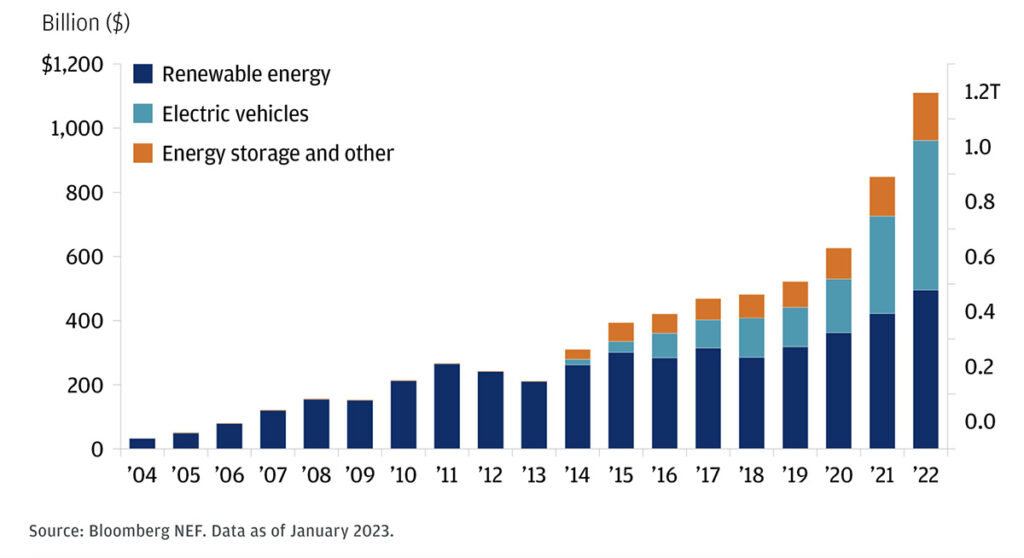Private markets are pivotal to the energy transition
Private markets, not public ones, are driving the overwhelming majority of investment in solutions needed to combat the climate crisis.
According to BloombergNEF, new investment in the renewable energy sector globally rose 13% in 2022 to $532 billion.[1] Private debt and investment accounted for 93% of the total, in the form of asset finance and small-scale solar projects. Investment in public markets accounted for just 3.3% of the total.[2]
Put simply, private markets offer the most direct and effective route for investors wishing to pursue greenfield opportunities in the renewables sector and contribute meaningfully to curtailing greenhouse gas emissions.
Private markets are also playing a crucial role in funding early-stage ventures working on climate solutions, allowing investors to get close to the action in projects that could help safeguard our future, but also offer solid long-term return potential.
Scenario analysis by the International Energy Agency concludes that in order to achieve net zero globally by 2050, nearly half of all emissions savings would need to come from technologies that have yet to be commercially deployed. Many of these technologies are being developed by companies that are categorised as startups—in other words, they are not publicly listed and have yet to achieve profitability. Their main source of funding is private equity and debt.

Image source: https://privatebank.jpmorgan.com/gl/en/insights/investing/the-energy-transition-is-ramping-up-investors-should-take-note
An immense opportunity
Given the transition to clean energy is estimated to require between $119 trillion and $194 trillion by 2050,[3] private markets will need to step up even further to meet the pressing climate investment need.
Private debt in particular is rushing in to fill the gap. Leading alternative investment manager Blackstone recently closed the biggest ever energy transition private debt fund at over $7 billion.[4] BlackRock has also acquired Kreos Capital, one of Europe’s largest loan providers to startups and high growth companies.[5]
Then there is global investment firm KKR & Co’s move to buy $550 million worth of solar energy loans extended to the customersof US-based startup SunPower Corp., which offers a solution to make it easier for homeowners to install solar energy solutions without having to bear the high up-front costs.[6]
And Ares Management Corp. and Copenhagen Infrastructure Partners have recently launched large private debt funds targeting the renewables sector.
What’s more, S&P Global reports that private debt providers are also working with banks on renewable energy project financing deals. These include big hydrogen projects on the US Gulf Coast, which have struggled to access financing as banks scale back lending. Private debt has come in to take on some of the risks traditional institutions are unwilling to bear in the current market environment—by doing so, the projects become bankable enough to also attract additional funds from mainstream lenders, allowing them to get off the ground.[7]
Riding renewables tailwinds with securities-based financing
These various private market investments targeting the energy transition stand to benefit from two critical tailwinds.
First, the economic fundamentals of renewable energy technologies continue improving rapidly. Solar and wind power is already cheaper than fossil fuels in many parts of the world, and their continued cost decline is set to make transformational technologies like green hydrogen increasingly viable.
And second, as the consequences of climate change become more visible and pronounced, major governments are likely to introduce more stringent regulations and more generous incentives designed to hasten the transition to greener energy sources. The US Inflation Reduction Act, for example, announced last year by President Biden, will provide substantial incentives for electric carmakers and other renewable energy companies over the next decade.
Individuals can also access innovative forms of private debt to access financing for small-scale renewable energy installations—through which they can collectively make a sizeable contribution to mitigating climate change. In a nod to SunPower’s playbook, homeowners and businesses could, for example, use securities-based financing from EquitiesFirst to install rooftop solar systems, which could lead to emissions reductions as well as savings on their energy bills.
More broadly, securities-based financing can provide a convenient and flexible way for long-term investors to use their equities or crypto as collateral to access liquidity to pursue a bewildering array of emerging opportunities related to the energy transition without having to sacrifice upside potential from their existing holdings.
Among these opportunities, it is worth highlighting that overall investment in electric vehicles last year was pretty much on par with investment in renewable energy. And energy storage appears to be an especially fast-growing investment segment, given one of the biggest remaining impediments to the widespread use of renewable energy is the difficulty of storing it.
Indeed, the energy transition is a critical theme that not only extends to practically every sector of the economy, but also enjoys a uniquely favourable regulatory and market climate. At a time when traditional lenders are wary of financing even such projects, securities-based financing provides a compelling means of keeping the transition moving forward.
[1] https://about.bnef.com/new-energy-outlook-series/
[2] https://www.alliancebernstein.com/n-europe/en-gb/institutions/insights/investment-insights/how-private-assets-can-empower-the-energy-transition.html
[3] https://about.bnef.com/new-energy-outlook-series/
[4] https://www.blackstone.com/news/press/blackstone-closes-record-energy-transition-private-credit-fund-at-over-7-billion/
[5] https://www.blackrock.com/corporate/newsroom/press-releases/article/corporate-one/press-releases/blackrock-to-acquire-kreos-capital
[6] https://www.spglobal.com/marketintelligence/en/news-insights/latest-news-headlines/private-credit-eyes-renewable-energy-ops-permira-direct-lending-fund-hits-8364-4-2b-76171377
[7] https://www.spglobal.com/marketintelligence/en/news-insights/latest-news-headlines/private-credit-eyes-renewable-energy-ops-permira-direct-lending-fund-hits-8364-4-2b-76171377
إخلاء مسؤولية
أعدت هذه الوثيقة خصيصاً للمستثمرين المعتمدين أو المستثمرين المتطورين ماليًّا أو المستثمرين المحترفين أو المستثمرين المؤهلين، على النحو الذي يقتضيه القانون أو غيره، وهي ليست موجهة للأشخاص الذين لا يستوفون المتطلبات ذات الصلة وينبغي عدم استخدامها من أجلهم. يستخدم محتوى هذه الوثيقة لأغراض إعلامية فقط ويغلب عليه الطابع العام ولا يلبي أي غاية محددة أو حاجة مالية معينة. تخص وجهات النظر والآراء الواردة في هذه الوثيقة أطرافًا ثالثة ولا تعكس بالضرورة وجهات نظر شركة “إيكويتيز فيرست” أو آراءها. لم تفحص شركة “إيكويتيز فيرست” المعلومات الواردة في هذه الوثيقة أو لم تتحقق منها بشكل مستقل، ولا تقدم أي تعهد بمدى دقتها أو اكتمالها. تخضع الآراء والمعلومات الواردة في هذه الوثيقة للتغيير من دون إشعار. لا يمثل محتوى الوثيقة عرضًا لبيع (أو طلب عرض شراء) أي أوراق مالية أو استثمارات أو منتجات مالية (يشار إليها باسم “العرض”). يجب تقديم أي عرض مماثل لذلك فقط من خلال عرض ذي صلة أو وثائق أخرى تحدد شروطه وأحكامه المادية. لا يشكل أي محتوى وارد في هذه الوثيقة توصية أو طلبًا أو دعوة أو إغراء أو ترويجًا أو عرضًا لشراء أو بيع أي منتج استثماري من شركة “إيكويتيز فيرست” أو “إيكويتيز فيرست هولدينجز المحدودة” أو الشركات التابعة لها (يشار إليها مجتمعة باسم “إيكويتيز فيرست”)، ولا يجوز تفسير هذه الوثيقة بأي شكل من الأشكال على أنها مشورة استثمارية أو قانونية أو ضريبية أو توصية أو مرجع أو إقرار مقدم من شركة “إيكويتيز فيرست”. وعليك طلب المشورة المالية المستقلة قبل اتخاذ أي قرار استثماري بشأن منتج مالي معين.
تحتفظ هذه الوثيقة بحقوق الملكية الفكرية لشركة “إيكويتيز فيرست” في الولايات المتحدة ودول أخرى، ويشمل ذلك على سبيل المثال لا الحصر، الشعارات الخاصة بها وغيرها من العلامات التجارية وعلامات الخدمة المسجلة وغير المسجلة. تحتفظ الشركة بجميع الحقوق المتعلقة بملكيتها الفكرية الواردة في هذه الوثيقة. ينبغي لمستلمي هذه الوثيقة عدم توزيعها أو نشرها أو إعادة إنتاجها أو إتاحتها كليًّا أو جزئيًّا بأي شكل من الأشكال لأي شخص آخر، لا سيما الأشخاص في دولة قد يؤدي توزيع هذه الوثيقة فيها إلى خرق أي شرط قانوني أو تنظيمي.
لا تقدم شركة “إيكويتيز فيرست” أي تعهد أو ضمان فيما يتعلق بهذه الوثيقة، وتخلي مسؤوليتها صراحة عن أي ضمان ضمني بموجب القانون. وعليه تقر بأن شركة “إيكويتيز فيرست” ليست مسؤولة تحت أي ظرف من الظروف عن أي أضرار مباشرة أو غير مباشرة أو خاصة أو تبعية أو عرضية أو عقابية أيًّا كان نوعها، منها على سبيل المثال لا الحصر، أي أرباح مفقودة أو فرص ضائعة، حتى إذا تم إخطار الشركة بإمكانية وقوع مثل هذه الأضرار.
تدلي شركة “إيكويتيز فيرست” بالتصريحات الإضافية الآتية التي قد تطبق في دول الاختصاص القضائي المذكورة:
دبي: تخضع شركة “إيكويتيز فيرست هونج كونج المحدودة” (التي يشار إليها باسم “المكتب التمثيلي بمركز دبي المالي العالمي”) الكائنة في مبنى حي البوابة 4، الطابق 6، المكتب 7، مركز دبي المالي العالمي (التي تحمل ترخيصًا تجاريًّا رقم CL7354) للوائح سلطة دبي للخدمات المالية بصفتها مكتبًّا تمثيليًّا (رقم مرجع الشركة لدى سلطة دبي للخدمات المالية:F008752 ). جميع الحقوق محفوظة.
تعد المعلومات الواردة في هذه الوثيقة عامة بطبيعتها، وإذا نُظر إليها على أنها مشورة، فإن أي مشورة واردة هنا عامة وقد تم إعدادها من دون النظر إلى أهدافك أو وضعك المالي أو ملاءمة منتجاتك المالية أو احتياجاتك.
تُستخدم المواد الواردة في هذه الوثيقة لأغراض معلوماتية فقط وينبغي عدم تفسيرها على أنها مشورة مالية أو عرض أو طلب أو توصية لشراء منتجات مالية أو بيعها. تعد المعلومات الواردة في هذه الوثيقة عامة بطبيعتها، وأي مشورة واردة هنا هي عامة وقد تم إعدادها من دون النظر إلى أهدافك أو وضعك المالي أو ملاءمة منتجاتك المالية أو احتياجاتك. لذا قبل استخدام أي من هذه المعلومات، يجب أن تفكر في مدى ملاءمتها لأهدافك ووضعك المالي واحتياجاتك وطبيعة المنتج المالي ذي الصلة. يمكنك استشارة مستشار مالي معتمد إذا لم تكن بعض محتويات هذه الوثيقة واضحة بالنسبة إليك.
تختص هذه الوثيقة بمنتج مالي لا يخضع لأي شكل من أشكال التنظيم أو الاعتماد الخاص بسلطة دبي للخدمات المالية. لا تتحمل سلطة دبي للخدمات المالية أي مسؤولية عن مراجعة أي وثائق تتعلق بهذا المنتج المالي أو التحقق منها. وعليه، لم تعتمد سلطة دبي للخدمات المالية هذه الوثيقة أو أي وثائق أخرى مرتبطة بها ولم تتخذ أي خطوات للتحقق من المعلومات الواردة فيها، ولا تتحمل أي مسؤولية ناجمة عنها.
أستراليا: تحمل شركة “إيكويتيز فيرست هولدينجز (أستراليا) ذات المسؤولية المحدودة” (رقم الشركة في أستراليا: 399 644 142) ترخيصًا لمزاولة الخدمات المالية في أستراليا (رقم الترخيص: 387079). جميع الحقوق محفوظة.
توجه المعلومات الواردة في هذه الوثيقة للأشخاص في أستراليا فقط المصنفين بأنهم عملاء في قطاع التجارة بالجملة على النحو المحدد في القسم 761G من قانون الشركات لعام 2001. قد يُقيد توزيع المعلومات على الأشخاص الذين لا تنطبق عليهم هذه المعايير بموجب القانون، ويجب على الأشخاص الذين يمتلكونها طلب المشورة ومراعاة أي قيود تتعلق بها.
تستخدم المواد الواردة في هذه الوثيقة لأغراض معلوماتية فقط وينبغي عدم تفسيرها على أنها عرض أو طلب أو توصية لشراء منتجات مالية أو بيعها.
تُعد المعلومات الواردة في هذه الوثيقة عامة بطبيعتها وليست مشورة شخصية بشأن المنتجات المالية. أي مشورة واردة في الوثيقة هي عامة فقط وقد تم إعدادها من دون النظر إلى أهدافك أو وضعك المالي أو احتياجاتك. لذا قبل استخدام أي من هذه المعلومات، يجب أن تفكر في مدى ملاءمتها لأهدافك ووضعك المالي واحتياجاتك وطبيعة المنتج المالي ذي الصلة. عليك طلب المشورة المالية المستقلة وقراءة بيانات الإفصاح ذات الصلة أو وثائق العرض الأخرى قبل اتخاذ أي قرار استثماري بشأن منتج مالي معين.
هونغ كونغ: تمتلك شركة “إيكويتيز فيرست هولدينجز هونج كونج المحدودة” ترخيصًا من النوع 1 من لجنة هونغ كونغ للأوراق المالية والعقود الآجلة، وهي مرخصة في هونغ كونغ بموجب قانون مقرضي الأموال (ترخيص مقرض الأموال رقم 2024/1659). لم تراجع لجنة هونغ كونغ للأوراق المالية والعقود الآجلة هذه الوثيقة. لا تمثل هذه الوثيقة عرضًا لبيع أوراق مالية أو طلبًا لشراء أي منتج تديره أو تقدمه شركة “إيكويتيز فيرست هولدينجز هونج كونج المحدودة”، لكنها موجهة للمستثمرين المحترفين لا للأفراد أو المؤسسات التي تكون هذه العروض أو الدعوات غير قانونية أو محظورة بالنسبة إليهم.
كوريا: توجه هذه الوثيقة فقط للمستهلكين الماليين المحترفين أو المستثمرين المحترفين أو المستثمرين المؤهلين الذين يتسلحون بالمعرفة ويتمتعون بالخبرة الكافية للدخول في معاملات تمويل الأوراق المالية، وهي غير مخصصة للأشخاص الذين لا يستوفون هذه المعايير وينبغي عدم استخدامهم إياها.
المملكة المتحدة: “إيكويتيز فيرست (لندن) المحدودة” هي شركة مرخصة وتخضع لرقابة هيئة الإدارة المالية البريطانية (FCA) في المملكة المتحدة. توزع هذه الوثيقة في المملكة المتحدة وتتاح فقط لفئات الأشخاص المذكورين في المادة 19 (5) (محترفي الاستثمار) والمادة 49 (2) (الشركات ذات الأرصدة المالية الضخمة وجمعيات الأفراد وغيرها) من الجزء الرابع من مرسوم الترويج المالي (FPO) لعام 2005 التابع لقانون الخدمات والأسواق المالية لعام 2000، وأي نشاط استثماري يتعلق بهذا العرض متاح فقط لهؤلاء الأشخاص، ولا يشارك فيه سواهم. يجب على الأشخاص الذين ليست لديهم خبرة مهنية في أمور الاستثمار أو من لا تنطبق عليهم المادة 49 من مرسوم الترويج المالي عدم الاعتماد على هذه الوثيقة؛ لأنها أعدت فقط للأشخاص المؤهلين بوصفهم مستثمرين محترفين بموجب توجيه الأسواق في الأدوات المالية (MiFID) وهي متاحة لهم.© حقوق الطبع والنشر لعام 2024 محفوظة لصالح شركة إيكويتيز فيرست هولدينجز هونج كونج المحدودة. جميع الحقوق محفوظة.
